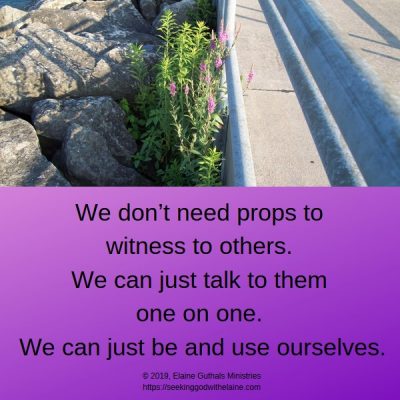Sing and make music from your heart to the Lord, always giving thanks to God the Father for everything, in the name of our Lord Jesus Christ.
Ephesians 5: 19-20 (NIV)
Scripture: Ephesians 5: 15-21
Becoming living sacrifices means changing our behavior so that we can live a life of worship that is pleasing to God. The next step is then sharing our joy with others. This devotion looks at being instruments of worship that God can use and tying life of worship, behavior of worship, and instruments of worship together.
Nuggets
- God wants us to be living sacrifices to Him so that we can use our testimonies to share His love with others.
- God wants us to do this through our everyday lives.
To read devotions in the What It Means to Be a Believer series, click the appropriate button below.

Living sacrifice is a difficult concept to understand. We can see where the change in behavior is expected. We know we are to worship God, but how do we sacrifice in worship?
Instruments of Worship
… to share with others, for with which such sacrifices God is pleased. Hebrews 13:16 (NIV)
Being a musician, I think instruments of worship is a great choice of words. I play flute and piano.
My Springfield Mom laughs at me. I went eight years accompanying the Singles Group on the guitar by using only three chords. (If I tried other chords, they couldn’t sing the songs. So, I used what worked!)
I had to learn how to play the notes. I needed to practice to figure out how to make them expressive. I needed to share what I had learned with others to help them make music.
What does that tell us?
We use our skills and our knowledge when witnessing to others.
My main instrument, though, when I was getting my associates degree in music was voice. Singing is what I do best.
Sometimes, I sing a cappella. It is just me and my voice. There are no instruments to support me — or to hide behind.
What does that tell us?
We don’t need props to witness to others. We can just talk to them one on one. We can just be and use ourselves.
Ooo, baby. That is scary! Especially when we throw in the concept of sacrifice.

"Then I will teach your ways to rebels, and they will return to you” (Ps. 51: 13 NLT).
Think about David when he received that forgiveness and restoration. He was admitting he was a murderer and adulterer.
If we ask, God will forgive us — even the big sins. If we witness, He may use those to help us connect with those to whom we are witnessing.
Being king, it was probably hard for David to hide his sins. Unlike David, we generally want and have a better shot at keeping our sins quiet.
We can, however, use our experiences to witness to others. Non-believers are more interested in hearing about how we navigate our challenges than hearing about Jonah being swallowed by a fish. (I mean, who was the last person you heard had that happen?)
To read God’s Light Shines Out Through Our Brokenness, click the button below.
“Forgive me for shedding blood, O God who saves; then I will joyfully sing of your forgiveness. Unseal my lips, O Lord, that my mouth may praise you” (Ps. 51: 14-15 NLT).
When we are mired in sin, we are not happy. We may think we are, but there are usually are not. God’s saving grace frees the joy within us.
But see what David did? He specifically named his sin. He didn’t hide it. He didn’t deny it.
Remember, David was king at this time. His admitting this could have been huge. Can we talk about lost confidence in his character and abilities to govern?
Instead, David put it out there. “God, I killed someone. Forgive me.” All these thousands of years later, we see that He did forgive him.
“You do not desire a sacrifice, or I would offer one. You do not want a burnt offering. The sacrifice you desire is a broken spirit. You will not reject a broken and repentant heart, O God” (Ps. 51: 16-17 NLT).
That is really what God wants. He wants our sincere request for forgiveness. He doesn’t want props or substitutes.
God wants a sorrowing heart and a changed mind and life. He wants our obedience to live the way we are called to live.
Even then when Israel was still making sacrifices, David knew that was not really what God wanted. God wanted a relationship — He still does. He wants us to turn from our sinful ways and turn back to Him.

"Look with favor on Zion and help her; rebuild the walls of Jerusalem. Then you will be pleased with sacrifices offered in the right spirit — with burnt offerings and whole burnt offerings. Then bulls will again be sacrificed on your altar” (Ps. 51: 18-19 NLT).
What do we gain by asking God’s forgiveness? We get joy, peace, restoration — renewal.
Making the Connections
We’ve discussed a lot over the last three days. It is time to pull it all together and see what we have.
We should have a broken and contrite heart. That goes against our sinful nature and the worldview that values success.
The success is not ours. The success belongs to God. He has given us knowledge and skills to function in this life. We need to acknowledge they come from Him and are not ours alone.
Being a living sacrifice with a changed behavior means we are to glorify God. Philippians 2: 5-7 says, “Have this attitude in yourselves which was also in Christ Jesus, who, although He existed in the form of God, did not regard equality with God a thing to be grasped, but emptied Himself, taking the form of a bond-servant, and being made in the likeness of men” (NASB). We are to follow Jesus’ example.
To read devotions in the What Does It Mean series, click the appropriate button below.
That isn’t easy. We will be fighting our sinful nature — and Satan himself sometimes — every step of the way. We are to work out our salvation, live for God daily, and use our experiences to expand His kingdom.
How Do We Apply This?
If we are to be a living sacrifice (Rom. 12: 1-2), what is our sacrifice?
We are to give everything to God. The Message says it this way: “So here’s what I want you to do, God helping you: Take your everyday, ordinary life — your sleeping, eating, going-to-work, and walking-around life — and place it before God as an offering. Embracing what God does for you is the best thing you can do for him” (Rom 12: 1 MSG). God wants the normal stuff, too.
We have to sacrifice the works of the flesh. Paul tells us what to get rid of in Galatians 5: 19-21, Ephesians 5: 3-6, and I Corinthians 6: 9-10 (and this is just a partial list): sexual immorality, impurity, homosexuality, idolatry/covetousness, jealousy, fits of anger, rivalries, dissensions, divisions, envy, greed, drunkenness, filthiness, and all impurity.
Yes, those are three lists of sins, but let’s face it. They are bright and shiny. Their allure makes it difficult to want to give them up.
We each probably have that one special sin that Satan keeps slipping in front of us. “Oh, go ahead. Indulge in this. God isn’t going to care. You are following Him in everything else. It is okay to keep this.”
It isn’t.
The “sleeping, eating, going-to-work, and walking-around life” is an interesting concept, but we might be scratching our heads at how to apply that. So, let’s try this:
- How are we following/not following God in our lives of leisure?
- How are we following/not following God in our social lives?
- How are we following/not following God in our work lives?
- How are we following/not following God in our goals for the future?
We have to identify what we are to sacrifice. We need to ask ourselves these questions:
- What sins are controlling us?
- What are our sinful desires?
- How are we being used as an instrument of evil?
- How can we give ourselves completely to God?
We sacrifice time. It takes time to pray. It takes time to read the Bible. It takes time to go to church. God can prepare us for the trials, but only if we spend time with Him.
But that is what transforms us. We store up treasures in heaven as we build our relationships with God.
Nothing can stop us from doing God’s will. It may not be easy, but it will be successful in the end.
We sacrifice our behavior. We let God call the shots and do what He wants us to do.
We sacrifice our comfort zone. It is hard to go through things we experience. It is hard to talk about them with someone else.
We are to be instruments that God can use as He has planned (Jer. 29: 11). An instrument is something someone else picks up and brings to life to make the music to touch others. We have Someone who can do just that.
Being a living sacrifice gets easier as we identify the patterns of the world and we allow God to renew our minds. The next devotions will discuss these concepts.
Gracious Heavenly Father. You have called us to be Your children. In doing this, You ask us to give up things that are detrimental to us. Help us to be living sacrifices to You. Change our behavior that we imitate Jesus. Show us how we can be instruments used to expand Your kingdom. Amen
Related Links
I have created two worksheets of the questions above. Click on the button below to access them.
What do you think? Where are you at in being a living sacrifice for God? What do you need to work on to be better?
Leave me a comment below (about this or anything else) or head over to my Facebook group for some interactive discussion.
If you have not signed up for the email daily or weekly providing the link to the devotions and the newsletter, do so below.
If God has used this devotion to speak with you, consider sharing it on social media.
Pingback: What Are the Patterns of the World? – Seeking God with Elaine
Pingback: How Are We Different from the World? (Part 1) – Seeking God with Elaine
Pingback: How Are We Different from the World? (Part 2) – Seeking God with Elaine
Pingback: How Do We Renew Our Minds? – Seeking God with Elaine
Pingback: How Do We Determine God’s Will? – Seeking God with Elaine
Pingback: How Do We Bring God Glory? – Seeking God with Elaine
Pingback: How Do We as Non-Preachers Proclaim the Gospel? – Seeking God with Elaine
Pingback: How Do Non-Preachers Make Disciples? – Seeking God with Elaine
Pingback: What Do You Mean Believers Have Other Duties as Assigned? – Seeking God with Elaine
Pingback: Check Your Attitude When You Worship God – Seeking God with Elaine
Pingback: Is Thankfulness Different from Praise? – Seeking God with Elaine
Pingback: Goodness as a Virtue – Seeking God with Elaine
Pingback: How Does Perseverance Help Consistency? – Seeking God with Elaine
Pingback: How Does Longsuffering Help Consistency? – Seeking God with Elaine
Pingback: Jesus, the Good Shepherd – Seeking God with Elaine
Pingback: How Does Boldness Help Consistency? – Seeking God with Elaine
Pingback: Witnessing as God Calls – Seeking God with Elaine
Pingback: Patience as a Virtue – Seeking God with Elaine
Pingback: Honoring the Lord through Worship – Seeking God with Elaine
Pingback: Isaiah’s Message of Salvation – Seeking God with Elaine
Pingback: The Prophecy of a Great Light – Seeking God with Elaine
Pingback: The Prophecy of a Meek Savior – Seeking God with Elaine
Pingback: What Are the Causes and Effects of Evil? (Part 3) – Seeking God with Elaine
Pingback: A Three-Step Approach to Knowing God – Seeking God with Elaine
Pingback: Forgiven by the Savior – Seeking God with Elaine
Pingback: What Should We Do about Who Jesus Is? – Seeking God with Elaine
Pingback: Attributes of God: Beautiful – Seeking God with Elaine
Pingback: Attributes of God: Providential and Caring – Seeking God with Elaine
Pingback: Transformed to Good – Seeking God with Elaine
Pingback: Focusing Our Thoughts Off of the World – Seeking God with Elaine